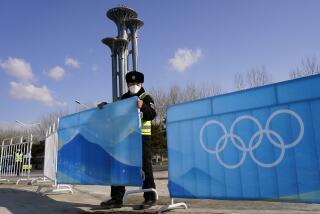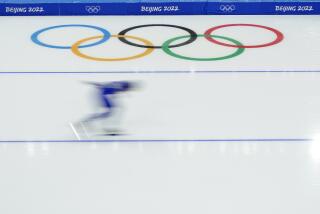London Olympics haven’t brought the gold merchants hoped for
- Share via
LONDON — All that gold, silver and bronze coursing through this Olympic city was supposed to equal the color of money for establishments like Tuttons, a popular restaurant in tourist-magnet Covent Garden. But with business down 40% from this time last year, the only color that manager Pedro Nunes is seeing is red.
“It’s very frustrating. Normally we have a very good August crowd … but people have been put off by the supposed crowds and transport problems,” Nunes said. “I can’t wait for the Olympics to finish.”
The 2012 Games are only a few days old, but complaints are already piling up over the absence, so far anyway, of the windfall that merchants in central London eagerly expected from hosting the world’s biggest sporting extravaganza. Parts of the city usually jammed with summer visitors, such as the West End theater district, are strangely quiet, and department stores and major attractions are asking where all the customers are.
The answer, it appears, is on the eastern side of town, where many of the premier Olympic events are taking place, and also at home, where Londoners frightened by months of warnings of apocalyptic traffic have remained in order to telecommute or just enjoy a few days off to watch the Games on the telly.
The unexpected lull in the heart of London could spell trouble for the British economy, which shrank by 0.7% in the last quarter. Officials had promised a badly needed Olympic fillip to help lift the country out of its double-dip recession; if the boost doesn’t materialize,Britain’sfunk could be longer and deeper than feared.
“Olympics would earn billions, we were told. Some hope!” the Daily Mail tabloid harrumphed Wednesday.
Usual tourist must-sees such as St. Paul’s Cathedral and the British Museum reported a 35% drop in visitors last week compared with the same period last year, said Bernard Donoghue of the Assn. of Leading Visitor Attractions.
“The Olympic tourist doesn’t act like a normal tourist would,” Donoghue said. “They tend not to go to theater and other attractions. Their Olympic-based itineraries are usually so prescriptive they have to be at venues at specific times.”
These days, tickets for popular West End productions are readily available, lines outside tourist sites are uncharacteristically short, and booking a table at a trendy restaurant presents little trouble.
Many merchants blame Olympic organizers and city officials for scaring away business through an overzealous campaign that essentially warned people to stay away from central London during the Games, which conclude Aug. 12.
For days before the opening ceremony, the stentorian tones of Mayor Boris Johnson boomed out over loudspeakers on the Underground system advising Londoners to change their travel patterns to avoid getting stuck. Government departments put civil servants in rotations to work from home.
Thus far, save for a few stumbles, London’s aging transit network of buses, trams, subways and trains has held up unexpectedly well, delivering workers as well as Olympic event-goers to their destinations fairly smoothly. The situation is reminiscent of that in Los Angeles in 1984, when a projected traffic meltdown from the Olympic Games never came to pass, after enough commuters found alternate routes to work or stayed home.
Johnson’s recorded warning on the Underground was discontinued this week. The mayor’s office said it had served its purpose of getting Londoners to plan.
But some business owners complain that it succeeded too well. Though some news media descriptions of London as a ghost town are exaggerated, many merchants are facing steep losses where they had anticipated robust profits.
“We are all suffering,” said Harriet Cameron, who sells scarves in the plaza at Covent Garden. “We were expecting it to be crowded here, but for the last two weeks about half the number of normal tourist customers have been coming here.”
To a certain degree, central London’s loss has been East London’s gain. The huge new mall abutting Olympic Park, billed as Europe’s largest urban shopping complex, is now seething with people.
“It’s only usually like this on Saturdays,” said Oyin Johnson, who works at a shoe store.
Stobart is a news assistant in The Times’ London bureau.
More to Read
Go beyond the scoreboard
Get the latest on L.A.'s teams in the daily Sports Report newsletter.
You may occasionally receive promotional content from the Los Angeles Times.







